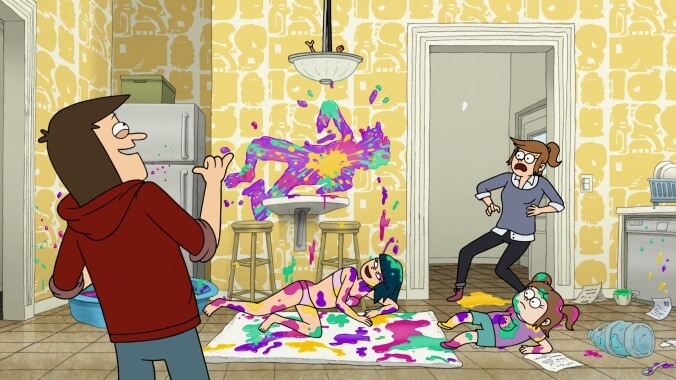TBS planned to expand heavily into adult animation programming. The network green-lit four new animated shows between 2016 and 2018: Tarantula, Final Space, Close Enough, and The Cops. Tarantula was cancelled due to low ratings, The Cops was scrapped mid-production due to the fallout of Louis CK’s admitted sexual misconduct, and Final Space was shunted off to Adult Swim. With presumably no more options to build an animation block around, Close Enough was shelved and left in limbo for three years. Now it’s finally getting its debut on HBO Max. Fans of Regular Show will immediately recognize its visual style and over-the-top climaxes, but may also find similar flaws from J.G. Quintel’s original show as well.
Close Enough starts out brimming with potential: We meet Josh (Quintel) and Emily (Gabrielle Walsh), a married couple trying to help their daughter, Candice (Jessica DiCicco) with a school project, but Josh gets caught up in silly distraction—a zoot suit, a talking parrot. The episode is awash with the kind of offbeat, nonsensical humor that Regular Show is known for, and like that show, it escalates into outlandish, unexpected insanity during the climax. Josh and Emily run into a bunch of street urchins that assist the couple with their project, only for them to be revealed as a bunch of creepy old people who are obsessed with being “parented.” It’s bizarre and ridiculous, but the Close Enough creative staff keeps enough focus on the broad struggles young, new parents have in relation to their care: looking for easy ways out, getting distracted by nostalgia, the desire for easy praise and appreciation.
These are universal themes, sure, but Close Enough homes in on the characters and the specificity of that transition between adolescence and adulthood. That insight keeps Close Enough cooking at a good pace, generally staying away from easy generational differences gags or “millennials killed [blank]” quips. It also allows the show to approach cliched plotting in unique ways. A later episode shows Candice attempting to escape the insanity of her overcrowded living situation by getting lost in the world of open houses; it eventually dovetails into her being trapped in a fake sitcom-esque existence, with a fairly clever ending. Close Enough also has its central couple living with two other people, Alex (Jason Mantzoukas) and Bridgette (Kimiko Glenn), a divorced couple that mostly functions as overactive foils to Josh and Bridgette; Mantzoukas and Glenn bring so much energy and vitality to their roles that they almost threaten to overtake the main characters.
As the show goes on, Close Enough’s flaws become more apparent, mostly due to structural and premise-based decisions. Each episode comprises two 11-minute segments; after the first few episodes, the segments suddenly start to take on distinct A and B plots, with little time to develop either. This contributes to a rushed, discombobulated feel that interrupts the development of characters and plots, and threatens to freewheel into Adult Swim-like nonsense. Later, we learn that Josh and Emily live with Alex and Bridgette not due to the sheer high cost of living in suburban Los Angeles, but so their daughter can go to a better school district. Close Enough was created three years before the issues of inequality at all levels, including education, vaulted to the forefront of contemporary discourse, but still, there’s something quietly ugly in how the show depicts the public school environment (jokes about “the bad neighborhood” are hard to pull off without coming off dismissive). And lest one think it was a throwaway one-off joke, a later gag seems to punch down pretty hard on single moms. Close Enough is too absurd and too focused on that adolescent-to-adulthood journey to get too caught up in examining how it plays within a social context. But jokes like that demonstrate how narrow its lens can be in the overall direction of the show. Similarly, Close Enough’s storytelling is so specific to Josh’s concerns that we don’t get to really see Walsh push Emily as a character.
Still, Close Enough has enough sharp gags and snappy commentary on its world to keep viewers interested, even as it sort of overwhelms itself. It riffs on non-traditional schooling, the use of free time as an excuse for finishing up tasks, the recognition of no longer enjoying the perks of youth, and the struggle of reconnecting with old friends and old lives. Late in the series, Josh and Alex try to bond over Jim Carrey films like they did when they were younger; Emily and Bridgette attempt to do the same by writing comedy songs. This same episode also includes an anthropomorphic dog, a mad scientist, hypnotized animals with human parts and clothing, and “Weird Al” Yankovic. Quintel is up to his old tricks even in this new context, though those tricks clearly need updating.









































